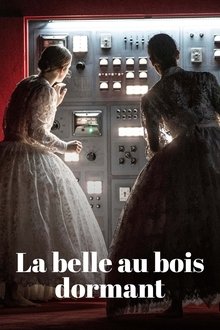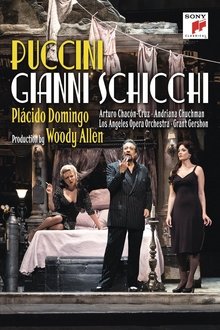What happened to Figaro and his friends after the events told in Rossini’s and Mozart’s operas? One possible sequel is told in John Corigliano’s “grand opera buffa” The Ghosts of Versailles—an uproariously funny and deeply moving work inspired by Beaumarchais’s third Figaro play, La Mère Coupable, and commissioned by the Met to celebrate its 100th anniversary. This telecast captures its world premiere run, conducted by James Levine. Håkan Hagegård is Beaumarchais, Figaro’s creator, who is deeply in love with Marie Antoinette (Teresa Stratas in a heart-searing performance) and determined to rewrite history and save her from the guillotine. A young Renée Fleming, at the beginning of her international career, sings the unfaithful Rosina. Gino Quilico is the wily Figaro who tries to take matters in his own hands, and Marilyn Horne stops the show as the exotic entertainer Samira.
Related Movies
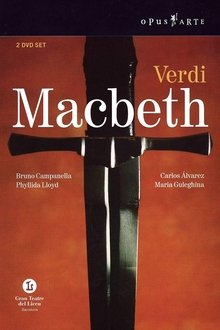
Macbeth (2004)
Carlos Álvarez takes the title role in the first of Verdi's Shakespearean operas, with Maria Guleghina as the manipulative wife whose desire to gain the Scottish throne drives her husband to murder and leaves both with blood on their hands. Bruno Campanella conducts the Symphony Orchestra and Chorus of the Gran Teatre del Liceu in the 2004 recording of Phyllida Lloyd's powerful production, first staged at London's Royal Opera House.
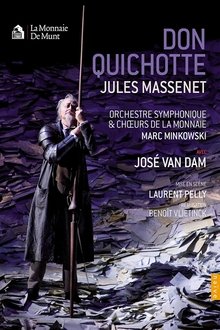
Don Quichotte (2010)
This May 2010 production of Massenet's 1910 opera "Don Quichotte" marked the opera's centenary and also Jose Van Dam's operatic farewell at the Theatre de la Monnaie, Brussels. It is beautiful in every way--vocally, scenically, sonically, and visually--and a worthy record of Van Dam's farewell. Van Dam is just shy of 70 in this production, but you would never guess it from his singing or stage movements--a consummate artist. His is a noble portrayal and deeply moving. The Act V death scene is a model of beautiful singing and acting.
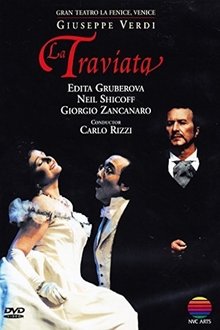
Verdi La Traviata (1992)
This set has Edita Gruberova singing in top form, all her scooping cast aside, which one finds in abundance in her Lucia under Richard Bonynge. Here, however, she makes ravishing use of those bits of tone that only she can produce: those instances of coloratura and dramatic legato with little asides and small florishes of style that suggest her intelligent approach and her high degree of musical involvement in this role. She does this in her I Puritani and her Anna Bolena, less so in Roberto Deveraux and Maria Stuarda(both sets). Listen to Addio del passato and the Sempre Libra...ravishing, yes, but there are again those nuances learned from Callas that she makes her own. A very singualr perform,ance, and extremely moving with its detail and cry for pity throughout..from the start even. Neil Schicoff is excellent, not an unworthy Alfredo at all! His is a great lyric tenor voice that should have been in the top line.

Amadeus (1984)
Disciplined Italian composer Antonio Salieri becomes consumed by jealousy and resentment towards the hedonistic and remarkably talented young Salzburger composer Wolfgang Amadeus Mozart.
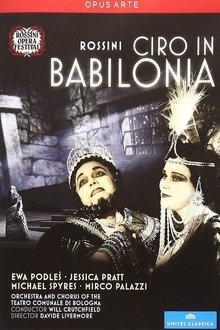
Ciro in Babilonia (2012)
The Biblical story of Belshazzar's hubristic arrogance, set against the valour of the young warrrior-leader Cyrus, provided the 20-year-old Rossini with a dramatic story enriched by West-Eastern implications which still speak to us today. For the title role of Cyrus, Rossini wrote what would be his longest-ever contralto role, to which the great Rossini singer Ewa Podles´ is both naturally attracted and ideally suited. She is partnered by two young stars of Rossini singing, Jessica Pratt and Michael Spyres, and a conductor-scholar, Will Crutchfield, of great experience and sympathy. Filmed in High Definition and recorded in true Surround Sound.
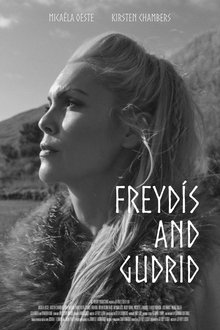
Freydís and Gudrid (2024)
A group of merchants and vikings navigate dramatic events both within and without in this epic musical based on the Icelandic Vinland sagas. As secrets are exposed, two women (Freydís and Gudrid) have a reckoning.
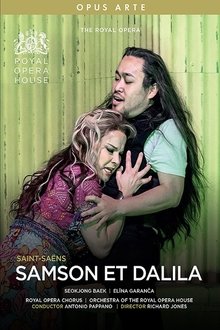
Samson Et Dalila (2024)
Pious restraint comes face to face with sensuous hedonism in Camille Saint-Saëns’s grand-opera retelling of the Bible story of Samson and Delilah. Multi-Olivier Award winning director Richard Jones returns to The Royal Opera to stage this spectacular fin-de-siècle masterpiece, not performed at Covent Garden since 2004. Elina Garanca stars as the Philistine Dalila, SeokJong Baek as the inspiring Jewish hero Samson and Antonio Pappano conducts the full forces of the Orchestra of the Royal Opera House. With superb singing in solos and duets of great intimacy and fervour, gorgeous music with thrilling orchestral interludes, and splendid choral numbers for the Royal Opera Chorus – this is a performance to remember.
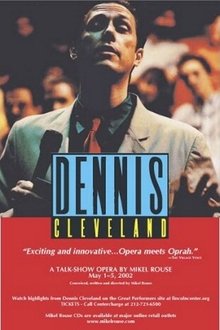
Dennis Cleveland (2004)
A 2002 live performance of Mikel Rouse's Dennis Cleveland, a multimedia opera set entirely on a television talk show in the late 20th century.
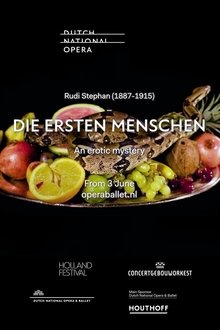
Rudi Stephan: Die ersten Menschen (2021)
The 2021 production by the Dutch National Opera of the work by German composer Rudi Stephan (1887–1915) "Die ersten Menschen" ("The First Humans"), completed in 1914 to a libretto by Otto Borngräber interpreting the Biblical story of the Garden of Eden through symbolism and the then nascent science of psychoanalysis. This production was part of the Holland Festival of Amsterdam.
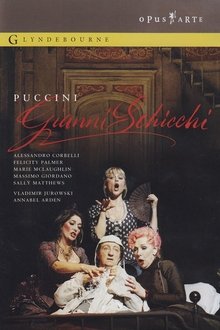
Puccini: Gianni Schicchi (2004)
Opera in one act, libretto by G. Forzano based on Dante's Divine Comedy. Third part of his opera Triptych. The plot is based on canto XXX of "Inferno" from "The Divine Comedy", which are dedicated to the rogue and deceiver Gianni Schicchi, who was punished for his sins: he impersonated a dying rich man in order to make a forged will on his behalf. Gianni Schicchi is Puccini's only comic opera, a brilliant example of a modern opera buffa based on the tradition of Verdi's Falstaff. The most expressive recitative, bubbling melody, sharp character, impetuous tempo distinguish her music. Recorded live at Glyndebourne Opera House, Sussex, UK on 11 July 2004.

The Newspaper (2005)
The writer Dario Fo applies his inventive genius to Rossini's comic opera in its premiere DVD release. Recorded in 2005 under the musical direction of Maurizio Barbacini, Fo's production brings fresh vitality and colour to the story of Lisetta, and of her father Don Pomponio's increasingly ridiculous attempts to find a husband for her through an advertisement in the newspaper LA GAZZETTA. Filmed using high definition cameras with multitrack sound.

Prodaná nevěsta (1976)
Set in a South Bohemian village, this faithful film version of Smetana’s opera follows farmer Krušina’s plan to marry his daughter Mařenka to wealthy Vašek. Mařenka loves Jeník, a stranger. Through matchmaking schemer Kecal’s plots and revealed identities, true love triumphs in a festive village wedding.

Werther (2005)
The production was the Vienna State Opera debut for the young Swiss conductor Philippe Jordan – the Argentinian tenor Marcelo Álvarez, took the title role. His Charlotte on this occasion was the young Latvian mezzo-soprano Elīna Garanča. Her performances have been enthusiastically received and she has already been labelled as the new mezzo wonder. Staged by internationally sought-after Rumanian director, Andrei Serban, the apparently sentimental love story – normally presented in 18th century period costumes - reveals a study of personal relationships and a close observation of a woman, who comes of age too late. Serban’s aim was to rid the opera of the unjustified reputation of banality that clings to it despite its underlying tragic mood. By setting the production in the stiff, claustrophobic atmosphere of a small town in the 1950s, he aimed to make the audience more aware of its deeper levels of self-denial.

Rameau Hippolyte et Aricie (2014)
Emmanuelle Haïm has established herself as one of the world’s leading performers, conductors and interpreters of Baroque repertoire, not only with Le Concert d’Astrée, the ensemble she founded in 2000, but with several of the world’s greatest orchestras. Known for her fresh and expressive approach to Baroque music, she has garnered critical acclaim and several international awards with her own ensemble, including Victoires de la Musique Classique, ECHOs, Gramophone Awards, and Grammy nominations.
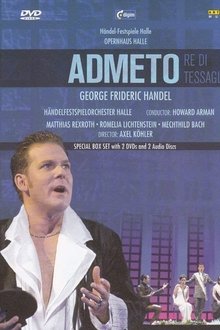
Handel: Admeto (2006)
Axel Kohler, the internationally renowned countertenor has brought Admeto into the modern era in timeless style by the skillful application of imaginative theatrical digressions. Köhler's production at the Halle Opernhaus revisits a work that encompasses comedy, tragedy and almost absurd grotesqueness, couching it in the convincing metaphor of a modern hospital.

I Vespri Siciliani (1986)
I Vespri Siciliani must me Verdi's most underrated masterpiece. Most people are put off by the fact that it has 5 acts, therefore they conclude that it must be incredibly long. It is long but not as long as some people may fear as most of the acts are under half an hour each. The total length of the DVD in question is 171 minutes, just under 3 hours, including titles at the beginning, applauses and curtain calls between the acts and at the end. The opera contains Verdi's most powerful overture and a number of very elegant arias, duets and ensembles for the principals.
